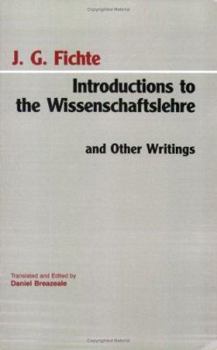Introductions to the Wissenschaftslehre and Other Writings (1797-1800)
Select Format
Select Condition 
Book Overview
These selections provide a brief but comprehensive introduction to Fichte's philosophical system and his place in the history of German Idealism. In addition to some of Fichte's most influential... This description may be from another edition of this product.
Format:Paperback
Language:English
ISBN:0872202399
ISBN13:9780872202399
Release Date:July 1994
Publisher:Hackett Publishing Company
Length:264 Pages
Weight:0.05 lbs.
Dimensions:22.2" x 14.0" x 14.0"
Related Subjects
Education & Reference History & Surveys Philosophy Politics & Social Sciences ReferenceCustomer Reviews
3 ratings
Brilliant
Published by Thriftbooks.com User , 13 years ago
This work is a much clearer exposition of Fichte's 'Wissenschaftslehre,' when one compares it to his later work. Although overlooked today, Fichte's Idealism is a truly significant development in post-critical philosophy. Fichte attacks the Kantian opposition between the critical and dogmatic in his disavowal of the thing in itself. Fichte wants to locate the absolute in the structure of self-consciousness itself, in the I am I formulation. This work should be read as more than a mere stepping stone to Hegel; it also is the source of considerable developments in German Romanticism, from Schelling, Holderlin and Novalis. Though flawed, the 'Wissenschaftslehre' is indispensable to the history of epistemology.
Clearly marks a break between philosophy and theology.
Published by Thriftbooks.com User , 22 years ago
All it took to get Fichte to collapse into a claim that he was merely a philosopher by 1800, when he wrote a few of his defenses in this book, was the charge that he was being atheistic in his faith in a moral world order rather than the kind of proofs of God that Kant had found unconvincing. His ideas about a moral world order make more sense to me as a philosophy than the concepts that make up more of this book. In our time, being considered an atheist has its defenders among those who consider themselves as respectable as other people, so I can't sympathize with those educated people who believe that God can't be defined in a moral way. There still is a tendency to condemn individuals for clinging to their own views, and Fichte's admission that any minister who declared from the pulpit that Fichte now has it right, while the church has been wrong all these years, could be removed from his pulpit for official incompetence. Philosophy is not really being defended against much when the main defense is that it is just a philosophy. The moral world order may be even less believable now, since Kafka and Walter Kaufmann in EXISTENTIALISM FROM DOSTOEVSKY TO SARTRE declare that the moral order is based on a lie. Fichte is lucky he didn't try saying that in 1800.
A lucid translation of Ficthe's difficult work.
Published by Thriftbooks.com User , 26 years ago
Breazeale,perhaps the foremost Fichte scholar in the English speaking world, gives a lucid translation of Fichte's classic, but sadly, underexamined work. Most notably, Breazeale's informative introduction provides the reader with a synopsis of Fichtean thought and the historical background in which it developed. Will be of interest to anyone interested in German philosophy after Kant. Highly recommended.





